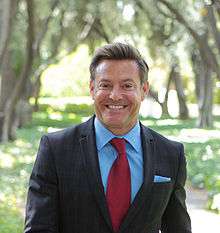Brock Blomberg
| Brock Blomberg | |
|---|---|
 | |
| 17th President of Ursinus College | |
|
Assumed office 2015 | |
| Preceded by | Bobby Fong |
| Personal details | |
| Born |
March 21, 1967 El Paso, Texas |
| Alma mater |
University of Tampa (BA) Johns Hopkins (MA and Ph.D) |
| Website | Ursinus College President's Office |
S. Brock Blomberg (born March 21, 1967) is the 17th president of Ursinus College.[1] A macroeconomist and former Professor of economics at Claremont McKenna College, Blomberg is best known in academia for his work on the economics of terrorism.
Early life and education
Blomberg was born in El Paso, Texas, the son of an Army officer who spent much of his early years moving from place to place.[2] He graduated from The University of Tampa magna cum laude in 1989 with a Bachelor of Arts in economics. He spent the next several years working on his Doctor of Philosophy at Johns Hopkins University. He worked as an intern economist for the Federal Reserve Board of Governors in 1992, foreshadowing his later position as a staff economist at the Federal Reserve Bank of New York.
Career
Blomberg was on the economics faculty of Wellesley College from 1995 to 2003.[1] In fall 2003, he joined the economics department at Claremont McKenna, where he received the David Huntoon Senior Teaching Award. He became the Dean of the Robert Day School of Economics and Finance at Claremont McKenna in June 2010.
He has held appointments on the President's Council of Economic Advisors, the Federal Reserve Bank of New York, the Federal Reserve Board of Governors, the International Monetary Fund and World Bank. He also served in the United States Military for eight years and been the United States representative to the Economic Committee for Asian Pacific Economic Cooperation (APEC). He was an investigator for the Center for Risk and Economic Analysis of Terrorism Events (CREATE) at the USC Sol Price School of Public Policy .[3]
He has published over 30 articles and book chapters in such top economics journals as the American Economic Review, Journal of Econometrics, Journal of Law and Economics, Journal of Monetary Economics, Journal of International Economics, Journal of Public Economics and the Review of Economics and Statistics.[4] His research shows that terrorism has a modest but statistically significant impact on the economy and trade is one area particularly sensitive to attacks.[5][6] He estimates the cost of the September 11 attacks to be approximately $60 billion.[7] The responsiveness of policy-makers and the resiliency of the United States economy are two reasons these impacts are not larger.[8]
Blomberg was named president of Ursinus College on April 30, 2015,[9] and was inaugurated on October 16, 2015.[10] In his first year at Ursinus, he has signed a transfer agreement with Montgomery County Community College[11] and spoken out about the importance of counseling services to students.[12]
Selected works
S. Brock Blomberg and Roz Engel. “Lines in the Sand: Border Effects, Economic Integration and Disintegration of Post- War Iraq” Journal of Law and Economics (2012): 503-538.
S. Brock Blomberg, Khrusav Gaibulloev, and Todd Sandler. “Terrorist Group Survival: Ideology, Tactics, and Base of Operations” Public Choice, Vol 149. Numbers 3-4 (2011): 441-463.
S. Brock Blomberg, Gregory D. Hess, and Yaron Raviv. "Where Have All the Heroes Gone? A Rational-Choice Perspective on Heroism." PublicChoice 141.3-4 (2009): 509-522
S. Brock Blomberg and Gregory D. Hess. "How Much Does Violence Tax Trade?." Review of Economics and Statistics 88.4 (2006): 599-612.
S. Brock Blomberg, Gregory D. Hess, and Athanasios Orphanides. "The Macroeconomic Consequences of Terrorism." Journal of Monetary Economics 51.5 (2004): 1007-1032.
S. Brock Blomberg, and Gregory D. Hess. "Is the Political Business Cycle for Real?." Journal of Public Economics 87.5-6 (2003): 1091-1121
Asea, Patrick K., and Brock Blomberg. "Lending Cycles." Journal of Econometrics 83.1-2 (1998): 89-128.
S. Brock Blomberg, and Gregory D. Hess. "Politics and Exchange Rate Forecasts." Journal of International Economics 43.1-2 (1997): 189-205
References
- 1 2 "Economist Brock Blomberg is 17th President". ursinus.edu. Retrieved 2015-05-06.
- ↑ "Archived copy" (PDF). Archived from the original (PDF) on 2010-12-16. Retrieved 2015-01-18.
- ↑ Jeff Blumenthal (2015-04-30). "Ursinus taps a political economist to take over". Philadelphia Business Journal. Retrieved 2016-06-30.
- ↑ http://www.cmc.edu/academic/faculty/profile.php?Fac=371.
- ↑ http://www.wsj.com/articles/SB10001424127887323789704578445121245795736
- ↑ http://www.lowyinterpreter.org/post/2010/06/08/Globalisation-and-war-Whats-the-evidence-for-Pax-Mercatoria-%28I%29.aspx?COLLCC=4165175269&
- ↑ http://news.yahoo.com/costs-9-11-attacks-still-haunt-us-economy-154303735.html
- ↑ http://www.theatlantic.com/business/archive/2011/05/the-cost-of-bin-laden-3-trillion-over-15-years/238517/
- ↑ "Ursinus College names economist Brock Blomberg its 17th president". The Times Herald, Norristown, Pennsylvania. 2015-04-30. Retrieved 2016-06-30.
- ↑ "Blomberg Extols Opportunity and the Liberal Arts". ursinus.edu. Retrieved 2016-06-30.
- ↑ "Montgomery County Community College, Ursinus College form new partnership". The Times Herald, Norristown, Pennsylvania. 2015-12-04. Retrieved 2016-06-30.
- ↑ Lisa Scheid (2015-11-13). "TriCounty Chamber panel says student emotional distress is a critical issue". Reading Eagle. Retrieved 2016-06-30.